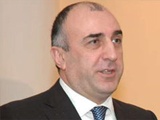INTERNATIONAL CRISIS GROUP – NEW BRIEFING
Baku/Yerevan/Tbilisi/Brussels, 7 October 2009: Armenia and Azerbaijan should endorse a document on basic principles to end stalemate on the Nagorno-Karabakh conflict by the end of the year, or they will face an eventual return to full-scale hostilities.
Nagorno-Karabakh: Getting to a Breakthrough,* the International Crisis Group’s latest policy briefing, examines the two-decades-old conflict and concludes there is reason for optimism that the political stalemate can be broken in today’s more supportive regional environment. However, it also warns that both governments and the international community must step up their efforts, as the status quo is increasingly untenable.
“Although a deliberate military offensive from either side is unlikely in the near future, the ceasefire that ended active hostilities fifteen years ago is increasingly fragile”, says Lawrence Sheets, Crisis Group’s Caucasus Project Director. “There has been a steady increase in the frequency and intensity of armed skirmishes that could unintentionally spark a wider conflict”.
The dispute between Armenia and Azerbaijan over the territory of Nagorno-Karabakh intensified following the breakup of the Soviet Union in 1991. However, the two countries are now in substantial agreement on the framework of basic principles first outlined by the Organisation for Security and Cooperation in Europe (OSCE) Minsk Group in 2005. This framework revolves around three fundamental principles: non-use of force, territorial integrity and self-determination.
As a first step to conflict resolution, Presidents Sarkisian of Armenia and Aliyev of Azerbaijan must prepare their publics for a possible peace deal. At present, there is a danger of a backlash, especially among Armenians, that could derail any basic principles agreement. After this agreement is signed, Nagorno-Karabakh’s de facto authorities and the Nagorno-Karabakh Azeri representatives should be part of subsequent peace talks. Crisis Group recommends the use of a multi-layered format, including direct contacts between Azerbaijan and Karabakh Armenians to help promote dialogue.
The international community, in particular the U.S., France and Russia as co-chairs of the OSCE Minsk Group, should intensify efforts to encourage Armenia and Azerbaijan to formally endorse the basic principles document and then open negotiations on a conclusive peace accord. The co-chairs should take advantage not only of their own productive collaboration, but also of current positive movement towards Armenia-Turkey rapprochement.
“There are encouraging signs the sides are inching towards agreement”, explains Sabine Freizer, Crisis Group’s Europe Program Director. “But differences still remain between Armenia and Azerbaijan on the specifics of a final deal, most seriously over Nagorno-Karabakh’s final status, and there is mutual distrust between the societies. Though a definitive settlement may still be years away, this window of opportunity to make genuine progress and support sustainable regional peace must not be missed”.
To listen to Lawrence Sheets, Crisis Group’s Caucasus Project Director, discussing the situation in Nagorno-Karabakh, please click here for the podcast.






